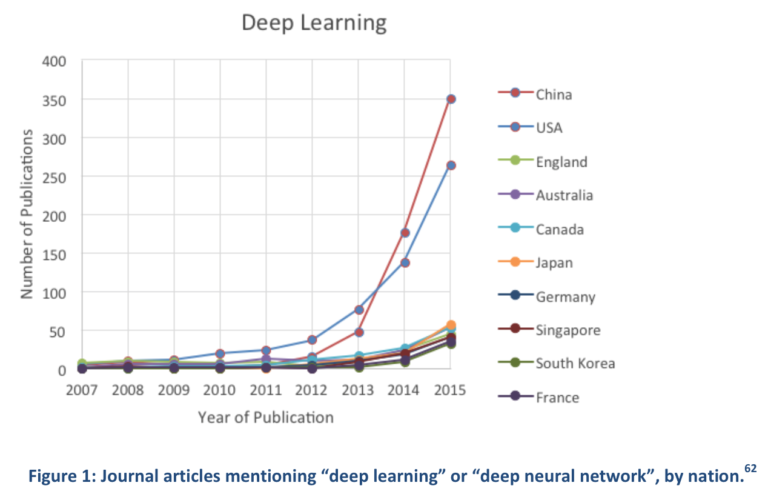
If my 11-year-old interviews for his first AI job out of college 10 years from now, he and his friends will want to be where all the action is. Chances are he’d end up in one of these four emerging North American AI hubs, or somewhere in China. I’m betting on Beijing.
The AI race is one where the winners win big and the losers lose bigger. It’s one where those who learn to run sooner also learn more rapidly how to run faster. While the race has just begun, it will essentially be over in 10-15 years. America will be left in the dust as China speeds ahead.
We’re not just talking about self-driving vehicles or AIs reading chest X-rays, but imagine increasingly advanced military tech (on the scale of nuclear weapons), cybersecurity and cyberwarfare (in a world where the most valuable assets are digital), and energy. PwC predicts $15.7 trillion of AI-driven economic benefit through 2030. That’s almost the size of the entire US economy! The full implications can’t truly be anticipated at this point.
While it is no sure thing, the deck is starting to be stacked for China to win big in these four ways:
The Chinese government is way more aggressive and strategic than the US, and wants to win this race — badly.
Democracy is great and all, but there are also significant benefits in a non-democratic, top-down society. If the leadership says so, the society does so – and can do so quickly and methodically. This Chinese leadership has made it clear that they intend to win AI, and will do whatever it takes – tax incentives, financial incentives, progressive policies, massive research budgets, early adoption awards, private/public partnerships – to get there. In their progressive AI development plan, China plainly lays out their domination strategy and timeline. Their technologies will begin to surpass the US in 2025 – “the Future of AI will be Made in China.” Additionally, the government can protect rig the system so that the Chinese market is owned by Chinese players.
Chinese entrepreneurs are much more ruthless.
These Chinese entrepreneurs are unlike the American entrepreneurs I know. Sleep only 4 hours a night for a whole year? No problem. No social life? Hey, only weaklings need down time. Cram 10 guys into a room designed for 3? Par for the course. These Chinese entrepreneurs are willing to sacrifice life and limb and go to the extreme. They exhibit an unusual trifecta of qualities: amazing brilliance, amazing work ethic, and amazing paranoia.
Always looking over their shoulder, today’s Chinese innovators inherited their parent’s massive paranoia of the fast-follower. China’s 1990s reputation of just being fast-followers (and counterfeiters) drives them even more. While current Chinese leadership touts AI, they have been touting entrepreneurship and innovation since 1990.
China has the fastest computers in the world
China has most supercomputers on the planet, by a long shot. Last month, it was reported that China surpassed the US for the first time, with 202 of the fastest 500 computers on the planet, compared to ~140 in the US. These room-sized beauties can do billions, trillions, and quadrillions of computations per second, an important capability that is required for developing data-heavy machine learning algorithms.
China has better information in two important ways
First of all, China has 4x more people and 3x more smartphone users than the US, and that means more data. With more data to crunch and the fastest data-crunching computers in the world, their engineers can more quickly build and optimize their machine learning algorithms.
But it’s not just the machines that have more data to crunch. So do the engineers and scientists, who can read all the cutting edge research that is coming out in English and Chinese. Even more dramatic, a recent White House report revealed that Chinese publications overtook American ones on the topic of deep learning in 2014.

Of course, quantity is not necessarily quality. And sometimes one great paper is better than 100 good ones. But make no mistake about it, China is doing real, break-through AI research, and their researchers seem to be much more collaborative.
Check out this quote from Eric Schmidt, Chairman of Alphabet:
“By 2020 they will have caught up. By 2025 they will be better than us. And by 2030 they will dominate the industries of AI… Trust me, these Chinese people are good. They are going to use this technology for both commercial as well as military objectives with all sorts of implications.” (source)
And who will lead China to AI domination? You have probably met America’s high tech darlings, FANG: Facebook, Amazon, Netflix, Google. Not surprisingly, they are among the biggest AI players. China is no different: their big 3, BAT (Baidu, Alibaba, TenCent), will create AI that we will all use for decades to come. Here’s a quick introduction:
- Baidu, China’s Google, is on a mission to win AI. With huge troves of search and user data, it’s spending at least $1.5B on AI research this next year.
- Alibaba has no counterpart in the West. Force me to come up with an analogy and I could simply say that Alibaba is China’s Amazon (but also throw in YouTube, Paypal, NYTimes, Ebay, and Fidelity!). At a $480B market cap, Alibaba has doubled in value in the last 12 months and handles more e-commerce than anyone else in the world. Just like Amazon, it has already implemented AI and considering dozens more applications. Alibaba aims to serve 2 billion customers and create 100M jobs by 2020.
- TenCent is China’s Facebook/YouTube/Paypal/Activision/Alexa/Dreamworks and is Asia’s most valuable company at $530B market cap. They are doubling down on AI with autonomous vehicles, social network/news/content, ad optimization, and more. With 938 million social media users, they have a lot of data to mine. And gosh darnit, little did I know that my favorite iPhone game, Clash of Clans, is owned by a TenCent subsidiary.
This brings us back to point #1 above about a very “strategic” Chinese government. Google, Twitter, and Facebook are banned to China, catapulting BAT to meteoric growth. In just two years, TenCent and Alibaba have gained $600 billion in market cap, with more growth to come.
